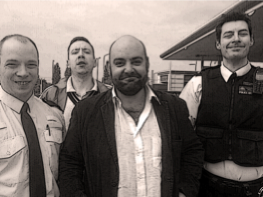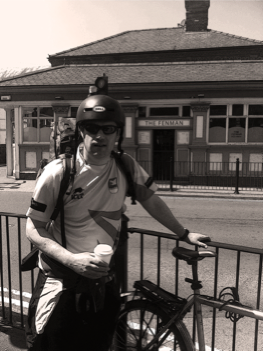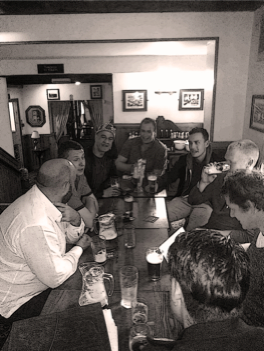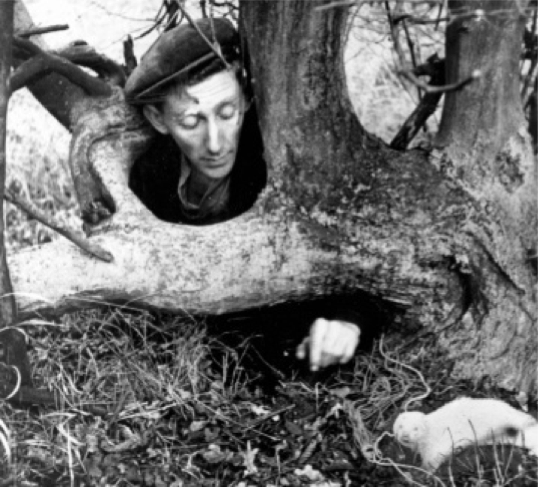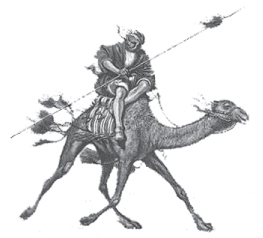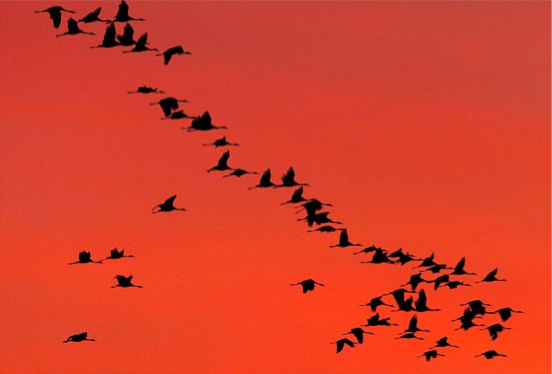
Holliday looked somewhat weary. ‘I expect,’ he said, conspiratorially, ‘that I stink of drink. Bit of a late night and all that.’
We had arranged to take the 10.15am from King’s Cross to King’s Lynn and thence to Castle Rising, where Phelan – late of the Indian Civil Service and the Madras Fencibles – had arranged a game of something he loosely termed cricket.
His team – known as the Bedouin because of their reputation for indolence and love of lounging – were a ragtag bunch of fellows, most of whom had somewhat left behind their youthful years.
What I hadn’t expected, though, was Holliday, normally a sartorially elegant sort, to arrive in a bright orange rugger jersey with the number 64 and the word ‘Fluff’ emblazoned across the shoulders.
I politely enquired the reason for this extraordinary mode of dress.
In reply he mumbled something barely discernible. I think it included the phrases: ‘Tight-end’, ‘feather duster’ and ‘relief of Ladysmith’, but I wouldn’t like to swear to it.
We sallied forth to platform seven, where the Norfolk Flyer awaited. Holliday unfurled a copy of The Times and looked at it askance, as if the newspaper itself had offered him some unexpected insult.
The mean suburbs of north-east London slipped past, then Welwyn, Stevenage and Cambridge. The land was becoming properly flat now. Waterbeach came into view and just as rapidly disappeared again and then, imposing above the Fenland, the cathedral at Ely reared up like a great, grey cliff.
Holliday looked up from the latest dispatches from the North-West Frontier with sudden animation. ‘Ah,’ he said, ‘Ely. The Norman triumph; built in Barnack stone, Purbeck marble and local clunch.’
‘What on earth is local clunch?’ I asked.
In reply, Holliday raised an eyebrow.
‘Use your imagination,’ he advised.
On we rolled through Littleport – scene of riots in 1816 and precious little since – and thence to Market Deeping and our ultimate destination.
Laden down with bags bulging with equipage we emerged onto the station forecourt like a latter-day Livingstone and Stanley, our eyes scanning the unfamiliar surroundings.
On an omnibus-stop a fantastical sign provided instructions in myriad languages on how to hail a cab – each translation topped by an outlandish flag combining the colours of red, green, blue, puce and aquamarine in ever-more unlikely proportions.
We were gazing in trepidation at this bizarre artifact when we were hailed from the opposite side of the road.
A man stood in the doorway of a pub, the words ‘The Fenman’ painted, disconcertingly, above his head.
He gazed at us with rheumy eyes, a hint of madness flickering across his stubbled cheeks.
‘You on some sort of tour?’ he asked, breathing heavily.
Quick as a flash Holliday responded: ‘Playing cricket. At Castle Rising.’
The man shook his head, a faint suggestion of spittle flecking his grimy collar.
‘Never heard of the place,’ he said, then added, with a jovial twitch of the neck.
‘You’re not from around these parts, are you?’
I had a sudden vision of Captain Souter at Gandamak, back to the wall, harried by furious natives. That, I thought, might at any moment be us.
Holliday, though, was ready for such a question.
‘No. I’m from Beccles,’ he said. ‘The other side of the county.’
Our interrogator looked bemused. ‘Beccles?’
‘Beccles.’
He shook his head again: ‘Never heard of it.’
But in the split-second it took for him to consider the geography of his home county we had mounted up and fled, peddling rapidly in the direction of Sandringham until the sound of pursuing footsteps and the anguished howl of ‘Beccles’ had finally been left behind.
After a moment spent composing ourselves we continued to Castle Rising, where a handful of the Bedu had assembled, largely dressed in cricket flannels and unlikely headgear.
Skipper Phelan, Harrison and Dr Asad were notable by their absence – they had apparently experienced a run-in with the law on the outskirts of London.
By mutual consent it was agreed that we should take first turn with the willow. Sherrington and Sharland opened the batting – the latter, as ever, looking like a veritable Doppelgänger for the Duke of Cambridge.
Their approach mixed circumspection with reckless aggression and we were musing as to what lay behind this odd strategy when Phelan and the others finally appeared.
‘Had a spot of unpleasantness with the Bobbies,’ said the Skipper jovially. ‘Pulled us over near Mill Hill and slapped us with a whopping great fine. Some nonsense about insurance and trespass on the Queen’s railway tracks. Poop-bleedin’-Poop.’
At that moment, though, our minds were brought back to the game. Sherrington had hit a catch to mid on and young Barras entered the lists.
A mere four runs later and he was back. Sharland and the skipper soon followed suit. The Bedu had slumped to 30-4 and were staring at a crushing defeat almost before they had begun.
But that was to discount Holliday and Harrison. Nobly they steadied the ship – Holliday resplendent in the Bedouin cap of chocolate, cerise, old gold and forest green; Harrison watchful and unflustered, like Hereward the Wake after a couple of large brandies.
The pair took the total to 94, when Holliday finally secumbed. RJT Gillham was next at the crease and looked in good form until undone by a skidder that crept under his groping bat.
The Bedouin tale twitched, but failed to wag, and although Harrison managed a well-deserved 50 not out he was finally left abandoned and forlorn.
Special mention here must go to last-man Graham. That doyen of the Shepherd’s Bush music hall could not resist a comic turn – stepping aside to let the second ball he faced flatten his woodwork before taking an extravagant bow in front of the bemused onlookers.
And so to an excellent tea. The Bedu, defending a frugal 147, held a council of war over a cup of Ceylon and an almond slice.
‘If we bowl straight and field well we can win this,’ suggested Phelan. ‘I remember a game at Cawnpore in ’96 against the Maharajah’s XI when we were in exactly this position.’
‘Did you win that one?’ asked Harrison, somewhat unkindly.
The skipper thought for a moment. ‘Come to think of it,’ he said, ‘I don’t believe we did.’
Dr Asad and Graham opened the bowling with verve and elegance, but the Castle Rising batsmen quickly reached 31. Then Blowers, looking to bludgeon Graham’s slower ball into Suffolk, only managed to loft it to Holliday, who duly pouched the catch.
Hard-hitting Upton then carved one to Sherrington, which left the Norfolk men at 54-2. The ever-elegant Bek joined Rosh at the crease and the pair duly stroked and hobbled their way to 92, at which point Rosh was unexpectedly bowled by the Duke of Cambridge.
Within a few balls the Duke had Mahesh caught behind by Petter – a Trojan at the stumps all day – and soon afterwards induced Melton-Day to loft one into the deep where RJT Gillham took a splendid catch.
The magisterial Bek, though, just trotted on – like a camel lengthening its stride towards a much-anticipated oasis – and, with the left-handed Sunil at his side, steered Castle Rising to a well-deserved victory with a brace of overs to spare.
The game had ended in bright sunshine, but now a strange thing happened. As myself and Holliday readied ourselves for the six-mile cycle ride back to King’s Lynn the weather suddenly changed; it was as if a sea mist had been conjured up by some long-forgotten necromancer of the east. Within minutes the sun was gone and a chill seemed to rise up from the very bowels of the earth.
Seeing us preparing to depart, Graham approached. He indicated our bicycle helmets.
‘You look like a pair of German officers in those,’ he said, with a rather coarse chuckle. ‘I know a song about that.’
We decided it would be best if we did not stay to hear it. Instead we set off into the ever-thickening mist, through villages marked by those distinctive East Anglian signs whose imagery hints at a place’s history: a tractor; a pheasant; a cow; a rabbit gripped by a snare…
We made good progress to the very outskirts of King’s Lynn when, out of the gloom, lurched a pallid, moon-faced figure. His eyes bulged and he looked wildly to left and right.
‘You seen a ferret anywhere?’ he stammered. ‘I’ve lost one.’
‘No,’ I replied, with some alarm. ‘I’m afraid I haven’t.’
He looked at me and spat into the cow-parsley by the track.
‘Well, if you do, you’ll be sure to tell me, won’t you?’
I nodded vigorously and we set off once again.
We had scarcely gone 50 yards when, for some reason that I cannot explain, I felt a pressing urge to look behind me.
The moon-faced man was standing stock-still in the path, staring straight at us.
Then, unexpectedly, he lifted his hand and waved. In that moment I felt a frisson of pure horror. I am convinced I saw something moving just above his belt buckle; something that wriggled and slithered and then emerged, blinking impatiently, its eyes red and angry, its teeth sharp and fierce.
It was, I am quite sure, the missing ferret.
We had arranged to take the 10.15am from King’s Cross to King’s Lynn and thence to Castle Rising, where Phelan – late of the Indian Civil Service and the Madras Fencibles – had arranged a game of something he loosely termed cricket.
His team – known as the Bedouin because of their reputation for indolence and love of lounging – were a ragtag bunch of fellows, most of whom had somewhat left behind their youthful years.
What I hadn’t expected, though, was Holliday, normally a sartorially elegant sort, to arrive in a bright orange rugger jersey with the number 64 and the word ‘Fluff’ emblazoned across the shoulders.
I politely enquired the reason for this extraordinary mode of dress.
In reply he mumbled something barely discernible. I think it included the phrases: ‘Tight-end’, ‘feather duster’ and ‘relief of Ladysmith’, but I wouldn’t like to swear to it.
We sallied forth to platform seven, where the Norfolk Flyer awaited. Holliday unfurled a copy of The Times and looked at it askance, as if the newspaper itself had offered him some unexpected insult.
The mean suburbs of north-east London slipped past, then Welwyn, Stevenage and Cambridge. The land was becoming properly flat now. Waterbeach came into view and just as rapidly disappeared again and then, imposing above the Fenland, the cathedral at Ely reared up like a great, grey cliff.
Holliday looked up from the latest dispatches from the North-West Frontier with sudden animation. ‘Ah,’ he said, ‘Ely. The Norman triumph; built in Barnack stone, Purbeck marble and local clunch.’
‘What on earth is local clunch?’ I asked.
In reply, Holliday raised an eyebrow.
‘Use your imagination,’ he advised.
On we rolled through Littleport – scene of riots in 1816 and precious little since – and thence to Market Deeping and our ultimate destination.
Laden down with bags bulging with equipage we emerged onto the station forecourt like a latter-day Livingstone and Stanley, our eyes scanning the unfamiliar surroundings.
On an omnibus-stop a fantastical sign provided instructions in myriad languages on how to hail a cab – each translation topped by an outlandish flag combining the colours of red, green, blue, puce and aquamarine in ever-more unlikely proportions.
We were gazing in trepidation at this bizarre artifact when we were hailed from the opposite side of the road.
A man stood in the doorway of a pub, the words ‘The Fenman’ painted, disconcertingly, above his head.
He gazed at us with rheumy eyes, a hint of madness flickering across his stubbled cheeks.
‘You on some sort of tour?’ he asked, breathing heavily.
Quick as a flash Holliday responded: ‘Playing cricket. At Castle Rising.’
The man shook his head, a faint suggestion of spittle flecking his grimy collar.
‘Never heard of the place,’ he said, then added, with a jovial twitch of the neck.
‘You’re not from around these parts, are you?’
I had a sudden vision of Captain Souter at Gandamak, back to the wall, harried by furious natives. That, I thought, might at any moment be us.
Holliday, though, was ready for such a question.
‘No. I’m from Beccles,’ he said. ‘The other side of the county.’
Our interrogator looked bemused. ‘Beccles?’
‘Beccles.’
He shook his head again: ‘Never heard of it.’
But in the split-second it took for him to consider the geography of his home county we had mounted up and fled, peddling rapidly in the direction of Sandringham until the sound of pursuing footsteps and the anguished howl of ‘Beccles’ had finally been left behind.
After a moment spent composing ourselves we continued to Castle Rising, where a handful of the Bedu had assembled, largely dressed in cricket flannels and unlikely headgear.
Skipper Phelan, Harrison and Dr Asad were notable by their absence – they had apparently experienced a run-in with the law on the outskirts of London.
By mutual consent it was agreed that we should take first turn with the willow. Sherrington and Sharland opened the batting – the latter, as ever, looking like a veritable Doppelgänger for the Duke of Cambridge.
Their approach mixed circumspection with reckless aggression and we were musing as to what lay behind this odd strategy when Phelan and the others finally appeared.
‘Had a spot of unpleasantness with the Bobbies,’ said the Skipper jovially. ‘Pulled us over near Mill Hill and slapped us with a whopping great fine. Some nonsense about insurance and trespass on the Queen’s railway tracks. Poop-bleedin’-Poop.’
At that moment, though, our minds were brought back to the game. Sherrington had hit a catch to mid on and young Barras entered the lists.
A mere four runs later and he was back. Sharland and the skipper soon followed suit. The Bedu had slumped to 30-4 and were staring at a crushing defeat almost before they had begun.
But that was to discount Holliday and Harrison. Nobly they steadied the ship – Holliday resplendent in the Bedouin cap of chocolate, cerise, old gold and forest green; Harrison watchful and unflustered, like Hereward the Wake after a couple of large brandies.
The pair took the total to 94, when Holliday finally secumbed. RJT Gillham was next at the crease and looked in good form until undone by a skidder that crept under his groping bat.
The Bedouin tale twitched, but failed to wag, and although Harrison managed a well-deserved 50 not out he was finally left abandoned and forlorn.
Special mention here must go to last-man Graham. That doyen of the Shepherd’s Bush music hall could not resist a comic turn – stepping aside to let the second ball he faced flatten his woodwork before taking an extravagant bow in front of the bemused onlookers.
And so to an excellent tea. The Bedu, defending a frugal 147, held a council of war over a cup of Ceylon and an almond slice.
‘If we bowl straight and field well we can win this,’ suggested Phelan. ‘I remember a game at Cawnpore in ’96 against the Maharajah’s XI when we were in exactly this position.’
‘Did you win that one?’ asked Harrison, somewhat unkindly.
The skipper thought for a moment. ‘Come to think of it,’ he said, ‘I don’t believe we did.’
Dr Asad and Graham opened the bowling with verve and elegance, but the Castle Rising batsmen quickly reached 31. Then Blowers, looking to bludgeon Graham’s slower ball into Suffolk, only managed to loft it to Holliday, who duly pouched the catch.
Hard-hitting Upton then carved one to Sherrington, which left the Norfolk men at 54-2. The ever-elegant Bek joined Rosh at the crease and the pair duly stroked and hobbled their way to 92, at which point Rosh was unexpectedly bowled by the Duke of Cambridge.
Within a few balls the Duke had Mahesh caught behind by Petter – a Trojan at the stumps all day – and soon afterwards induced Melton-Day to loft one into the deep where RJT Gillham took a splendid catch.
The magisterial Bek, though, just trotted on – like a camel lengthening its stride towards a much-anticipated oasis – and, with the left-handed Sunil at his side, steered Castle Rising to a well-deserved victory with a brace of overs to spare.
The game had ended in bright sunshine, but now a strange thing happened. As myself and Holliday readied ourselves for the six-mile cycle ride back to King’s Lynn the weather suddenly changed; it was as if a sea mist had been conjured up by some long-forgotten necromancer of the east. Within minutes the sun was gone and a chill seemed to rise up from the very bowels of the earth.
Seeing us preparing to depart, Graham approached. He indicated our bicycle helmets.
‘You look like a pair of German officers in those,’ he said, with a rather coarse chuckle. ‘I know a song about that.’
We decided it would be best if we did not stay to hear it. Instead we set off into the ever-thickening mist, through villages marked by those distinctive East Anglian signs whose imagery hints at a place’s history: a tractor; a pheasant; a cow; a rabbit gripped by a snare…
We made good progress to the very outskirts of King’s Lynn when, out of the gloom, lurched a pallid, moon-faced figure. His eyes bulged and he looked wildly to left and right.
‘You seen a ferret anywhere?’ he stammered. ‘I’ve lost one.’
‘No,’ I replied, with some alarm. ‘I’m afraid I haven’t.’
He looked at me and spat into the cow-parsley by the track.
‘Well, if you do, you’ll be sure to tell me, won’t you?’
I nodded vigorously and we set off once again.
We had scarcely gone 50 yards when, for some reason that I cannot explain, I felt a pressing urge to look behind me.
The moon-faced man was standing stock-still in the path, staring straight at us.
Then, unexpectedly, he lifted his hand and waved. In that moment I felt a frisson of pure horror. I am convinced I saw something moving just above his belt buckle; something that wriggled and slithered and then emerged, blinking impatiently, its eyes red and angry, its teeth sharp and fierce.
It was, I am quite sure, the missing ferret.
